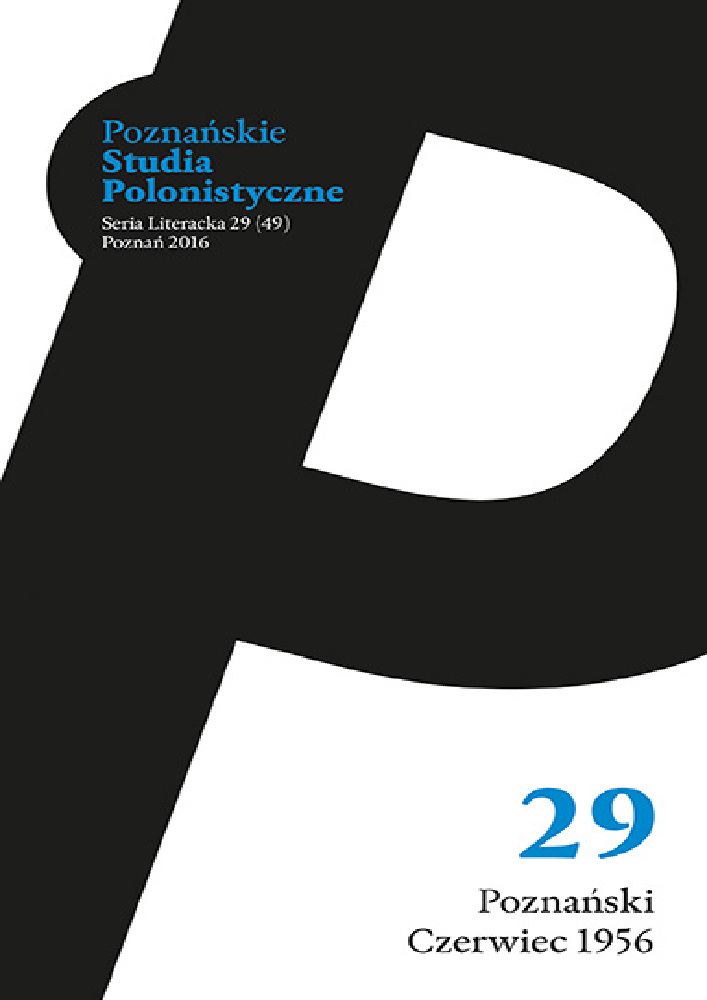Abstract
The article is a brief survey and evaluation of historical research on Poznań 1956 protests, the political change in October 1956, and the year in general. An important gap was filled by the publication of Piotr Grzelczak’s book on the long-term consequences of the Poznań protests, and the conflict over its remembrance between government representatives and local inhabitants of the region, since the protests were one of the defining moments in recent history of Poznań. The article also includes a summary of the controversy between historians over the importance of 1956 as a watershed in Polish history, with some historians arguing that a more liberal image of the communist system in Poland was formed in 1956, while others argued that the communist dictatorship was stabilized by winning wider social support. The author has indicated an increasing separation between narratives about the Poznań protests in June and the political transformations in October, which has consequences and threats related to polarized perception of history, leading to meagre and simplified understanding of social realities of the Polish People’s Republic after 1956.References
Codogni Paulina (2006), Rok 1956, Prószyński i S-ka, Warszawa.
Galant Jan (2010), Odmiany wolności. Publicystyka, krytyka i literatura polskiego Października, Wydawnictwo Naukowe Uniwersytetu im. Adama Mickiewicza, Poznań.
Gołębiowski Eugeniusz (2006), Mrok. Polska 1956, Norbertinum, Lublin.
Grzelczak Piotr (2016), Poznański Czerwiec 1956. Walka o pamięć w latach 1956-1989, Wydawnictwo Nauka i Innowacje, Instytut Pamięci Narodowej, Poznań–Warszawa.
Karpiński Jakub (1979), Porcja wolności. Październik 1956, Instytut Literacki, Paryż.
Karwat Janusz, Tischler János (2006), 1956 Poznań – Budapeszt, Media Rodzina, Poznań.
Kersten Krystyna, red. (1997), Polska 1956 – próba nowego spojrzenia („Polska 1944/45-1989”, t. 3), Instytut Historii PAN, Warszawa.
Kula Marcin (1992), Paryż, Londyn i Waszyngton patrzą na Październik 1956 roku w Polsce, Instytut Studiów Politycznych PAN, Warszawa.
Machcewicz Paweł (1993), Polski rok 1956, Mówią Wieki, Warszawa.
Machcewicz Paweł (2009), Rebellious satellite. Poland 1956, Woodrow Wilson Center Press, Stanford University Press, Stanford.
Maciejewski Jarosław, Trojanowiczowa Zofia, red. (1981), Poznański czerwiec 1956, Wydawnictwo Poznańskie, Poznań.
Makowski Edmund (2001), Poznański czerwiec 1956. Pierwszy bunt społeczeństwa w PRL, Wydawnictwo Poznańskie, Poznań.
Najder Zdzisław i in. (2014), Węzły pamięci niepodległej Polski, Fundacja Węzły Pamięci, Kraków.
Napiontkowa Maria (2012), Teatr polskiego Października, Instytut Sztuki PAN, Warszawa.
Nora Pierre (1984-1992), Les Lieux de memoire, Gallimard, Paris.
Persak Krzysztof (2006), Sprawa Henryka Hollanda, Instytut Pamięci Narodowej, ISP PAN, Warszawa.
Rowiński Jan, red. (2006), Polski październik 1956 w polityce światowej, Polski Instytut Spraw Międzynarodowych, Warszawa.
Rykowski Zbysław, Władyka Wiesław (1989), Polska próba – Październik ’56, Wydawnictwo Literackie, Kraków.
Szumiło Mirosław (2014), Roman Zambrowski 1909-1977. Studium z dziejów elity komunistycznej w Polsce, Instytut Pamięci Narodowej, Warszawa.
Szymoniczek Joanna, Król Eugeniusz Cezary, red. (2009), Rok 1956 w Polsce i jego rezonans w Europie, Instytut Studiów Politycznych PAN, Collegium Civitas, Warszawa.
Traba Robert, Hahn Hans Henning (2015), Polsko-niemieckie miejsca pamięci, t. 1, Wspólne/Oddzielne, Wydawnictwo Naukowe Scholar, Warszawa.
Ustalenia i stan śledztwa w sprawie przestępczych działań
funkcjonariuszy państwa komunistycznego podczas tzw. Wydarzeń
Poznańskich (S 23/00/Zk) (2016), [dostęp: 25 września 2016],
http://www.czerwiec56.ipn.gov.pl/c56/ofiary-i-represje/sledztwoipn/
,Ustalenia-i-stan-sledztwa-w-sprawie-przestepczychdzialan-
funkcjonariuszy-panstw.html.
Werblan Andrzej (2008), Sprzeciw Gomułki wobec dyktatu Kremla, Notatka z rozmów delegacji Prezydium KC KPZR i członków Biura Politycznego KC PZPR (Warszawa, 19 X 1956), cz. 1-2, „Dziś”, nr 9, s. 162-189; nr 10, s. 5-25.
Władyka Wiesław (1989), Na czołówce. Prasa w październiku 1956 roku, Państwowe Wydawnictwo Naukowe, Warszawa–Łódź.
Zawodniak Mariusz, Zwierzchowski Piotr, red. (2010), Październik 1956 w literaturze i filmie, Wydawnictwo Uniwersytetu Kazimierza Wielkiego, Bydgoszcz.
Ziętara Paweł (2001), Emigracja wobec Października. Postawy polskich środowisk wobec liberalizacji w PRL w latach 1955-1957, LTW, Warszawa.
License
Authors
Authors of texts accepted for publication in „Poznańskie Studia Polonistyczne. Seria Literacka” are required to complete, sign and return to the editor's office the Agreement for granting a royalty-free license to works with a commitment to grant a CC sub-license.
Under the agreement, the authors of texts published in „Poznańskie Studia Polonistyczne. Seria Literacka” grant the Adam Mickiewicz University in Poznań a non-exclusive, royalty-free license and authorize the use of Attribution-NoDerivatives 4.0 International (CC BY-ND 4.0)Creative Commons sub-license.
The authors retain the right to continue the free disposal of the work.
Users
Interested Internet users are entitled to use works published in „Poznańskie Studia Polonistyczne. Seria Literacka” since 2016, for non-commercial purposes only, under the following conditions:
- attribution - obligation to provide, together with the distributed work, information about the authorship, title, source (link to the original work, DOI) and the license itself.
- no derivatives - the work must be preserved in its original form, without the author's consent it is not possible to distribute the modified work, such as translations, publications, etc.
Copyrights are reserved for all texts published before 2016.
Miscellaneous
Adam Mickiewicz University in Poznań retains the right to magazines as a whole (layout, graphic form, title, cover design, logo etc.).
